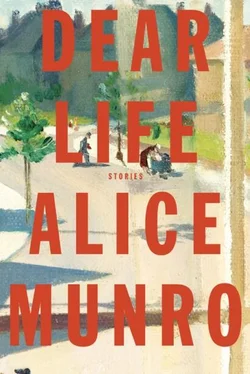There is a rounded desk, waist high, whose panels of dark wood look like mahogany, though they probably are not. Nobody behind it at the moment. It is after hours of course. She looks for a bell but does not see one. Then she looks to see if there is a list of doctors’ names or the name of the doctor in charge. She doesn’t see that either. You would think there would be a way of getting hold of somebody, no matter what the hour. Somebody on call in a place like this.
No important clutter behind the desk either. No computer or telephone or papers or colored buttons to press. Of course she has not been able to get right behind the desk, there may well be some lock, or some compartments she can’t see. Buttons a receptionist could reach and she can’t.
She gives up on the desk for the moment, and takes a closer look at the space she has found herself in. It’s a hexagon, with doors at intervals. Four doors—one is the large door that lets in the light and any visitors, another is an official and private-looking door behind the desk, not that easy of access, and the other two doors, exactly alike and facing each other, would obviously take you into the long wings, to the corridors and rooms where the inmates are housed. Each of these has an upper window, and the window glass looks clear enough for anybody to manage to see through.
She goes up to one of these possibly accessible doors and knocks, then tries the knob and cannot budge it. Locked. She cannot see through the window properly, either. Close up the glass is all wavy and distorted.
In the door directly opposite there is the same problem with the glass and the same problem with the knob.
The click of her shoes on the floor, the trick of the glass, the uselessness of the polished knobs have made her feel more discouraged than she would care to admit.
She does not give up, however. She tries the doors again in the same order, and this time she shakes both knobs as well as she can and also calls out, “Hello?” in a voice that sounds at first trivial and silly, then aggrieved, but not more hopeful.
She squeezes herself in behind the desk and bangs that door, with practically no hope. It doesn’t even have a knob, just a keyhole.
There is nothing to do but get out of this place and go home.
All very cheerful and elegant, she thinks, but there is no pretense here of serving the public. Of course they shove the residents or patients or whatever they call them into bed early, it is the same old story everywhere, however glamorous the surroundings.
Still thinking about this, she gives the entry door a push. It is too heavy. She pushes again.
Again. It does not budge.
She can see the pots of flowers outside in the open air. A car going by on the road. The mild evening light.
She has to stop and think.
There are no artificial lights on in here. The place will get dark. Already in spite of the lingering light outside, it seems to be getting dark. No one will come, they have all completed their duties, or at least the duties that brought them through this part of the building. Wherever they have settled down now is where they will stay.
She opens her mouth to yell but it seems that no yell is forthcoming. She is shaking all over and no matter how she tries she cannot get her breath down into her lungs. It is as if she has a blotter in her throat. Suffocation. She knows that she has to behave differently, and more than that, she has to believe differently. Calm. Calm. Breathe. Breathe.
She doesn’t know if the panic has taken a long time or a short time. Her heart is pounding but she is nearly safe.
There is a woman here whose name is Sandy. It says so on the brooch she wears, and Nancy knows her anyway.
“What are we going to do with you?” says Sandy. “All we want is to get you into your nightie. And you go and carry on like a chicken that’s scared of being et for dinner.
“You must have had a dream,” she says. “What did you dream about now?”
“Nothing,” says Nancy. “It was back when my husband was alive and when I was still driving the car.”
“You have a nice car?”
“Volvo.”
“See? You’re sharp as a tack.”
THAT fall there had been some discussion of death. Our deaths. Franklin being eighty-three years old and myself seventy-one at the time, we had naturally made plans for our funerals (none) and for the burials (immediate) in a plot already purchased. We had decided against cremation, which was popular with our friends. It was just the actual dying that had been left out or up to chance.
One day we were driving around in the country not too far from where we live, and we found a road we hadn’t known about. The trees, maples and oaks and others, were second growth, though of an impressive size, indicating that there had been cleared land. Farms at one time, pastures and houses and barns. But not a sign of this was left. The road was unpaved but not untravelled. It looked as if it might see several vehicles a day. Maybe there were trucks that used it as a shortcut.
This was important, Franklin said. No way did we want to be there for a day or two, or possibly a week, with no discovery. Nor did we want to leave the car empty, with the police having to tramp through the trees in search of remains that the coyotes might already have got into.
Also, the day must not be too melancholy. No rain or early snow. The leaves turned but not many fallen. Plastered with gold, as they were on that day. But perhaps the sun would not be shining, else the gold, the glamour of the day, might make us feel like spoilers.
We had a difference about the note. That is, about whether we should leave a note or not. I thought that we owed people an explanation. They should be told that there was no question of a fatal illness, no onset of pain that blocked out the prospect of a decent life. They should be assured that this was a clearheaded, you might almost say a lighthearted decision.
Gone while the going is good.
No. I retracted that. Flippancy. An insult.
Franklin’s idea was that any explanation at all was an insult. Not to others but to ourselves. To ourselves. We belonged to ourselves and to each other and any explanation at all struck him as snivelling.
I saw what he meant but I was still inclined to disagree.
And that very fact—our disagreement—seemed to put the possibility out of his head.
He said that it was rubbish. All right for him but I was too young. We could talk again when I was seventy-five.
I said that the only thing that bothered me, a little, was the way there was an assumption that nothing more was going to happen in our lives. Nothing of importance to us, nothing to be managed anymore.
He said that we had just had an argument, what more did I want?
It was too polite, I said.
I have never felt that I am younger than Franklin, except maybe when the war comes up in conversation—I mean the Second World War—and that seldom happens nowadays. For one thing, he does more strenuous exercise than I do. At one time he was the overseer of a stable—I mean the sort of stable where people board riding horses, not racehorses. He still goes there two or three times a week, and rides his own horse, and talks to the man in charge who occasionally wants his advice. Though mostly he says he tries to keep out of the way.
He is in fact a poet. He is really a poet and really a horse trainer. He has held one-term jobs at various colleges, but never so far away that he can’t keep in touch with the stables. He admits to giving readings, but only as he says once in a blue moon. He doesn’t stress the poetic employment. Sometimes I am annoyed with this attitude—I call it his aw-shucks persona—but I can see the point. When you’re busy with horses people can see that you are busy, but when you’re busy at making up a poem you look as if you’re in a state of idleness and you feel a little strange or embarrassed having to explain what’s going on.
Читать дальше












